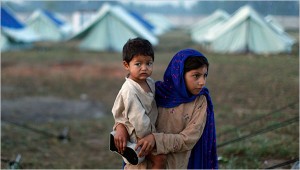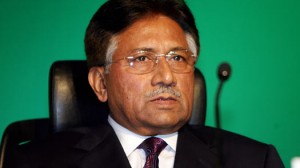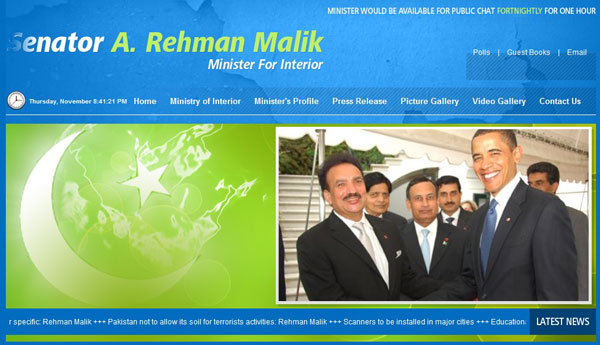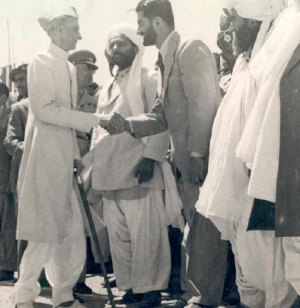 In a special joint session of the National Assembly and the Senate, the government today unveiled its promised “Baluchistan conciliation package” (synopsis of provisions and full text, below). This marks a small but important step forward in what one certainly hopes is a trend towards full integration of all Pakistanis into Pakistan. The package follows reform packages announced for FATA and for Gilgit-Baltistan, where elections were recently held. The contents of the package – yet to be discussed in to approved by parliament – are by no means comprehensive, and some Baluch leaders are already opposing it.
In a special joint session of the National Assembly and the Senate, the government today unveiled its promised “Baluchistan conciliation package” (synopsis of provisions and full text, below). This marks a small but important step forward in what one certainly hopes is a trend towards full integration of all Pakistanis into Pakistan. The package follows reform packages announced for FATA and for Gilgit-Baltistan, where elections were recently held. The contents of the package – yet to be discussed in to approved by parliament – are by no means comprehensive, and some Baluch leaders are already opposing it.
They have good reason to be be skeptical – not only because of what is not in the package but also because there is a long history of such steps being taken for political appeasement rather than as real triggers of systemic change in the structures and distributions of power. One certainly hopes that this time things are different and that Prime Minister Yousuf Raza Gillani’s offer of trying to “heal broken hearts” is a heartfelt sentiment and not just political theatrics.
The real test of this sincerity will be in how the government benches deals with the emotional debates that will ensue, how additional measures are undertaken to fully integrate the legitimate concerns of the province, and – most of all – in how sincerely the provisions that are agreed are implemented. None of this will be easy. But all of this will also be impossible without the Baluch leadership also demonstrating a willingness to make conciliation work. Many of their apprehensions are legitimate but so is the need for national integration to become national purpose. That is the test not only of the government and of the Baluch leadership, but also of other mainstream political parties.
From a first perusal, it seems a number of important issues have been included in the package – including an enquiry into the killing of Nawab Akbar Bugti (described as ‘Shaheed’ in the Bill), more provincial say and clear share in provincial resources including natural gas, and the questions of how military and federal government institutions operate in the province. However, in many cases the language is very preliminary and uncertain and it is not at all clear what the full scope of actions will be, whether it will cover all past issues or how future decision-making on sensitive issues will be dealt with. This is – or at least could be – a positive step for the country, but there is much – maybe too much – that still needs to be clarified and expanded. The worst outcome would be if the government were to see this as their ‘final’ position or if Baluch leaders were to retreat from dialogue because this is just not enough.
In his speech at the special session the Prime Minister said that he wants this to be the beginning of a dialogue amongst “estranged brothers.” I would like to take him for his word. I hope the Baluch leadership within parliament and outside will also do so. Then, it will be up to the Prime Minister to prove that he really meant what he said.
By way of background, here is a synopsis of key provisions as highlighted in Dawn:
Constitution-related matters
- Constitutional amendments about provincial autonomy being considered by the parliamentary committee be addressed immediately.
- The committee considering deletion of the concurrent list, the Police Order of 2002 and the Balochistan Local Government Ordinance of 2001, effective implementation of article 153 on the Council of Common Interests, and implementation of articles 160 (NFC award), 154 (council functions and rules of procedure), 155 (interference with water supplies), 156 (National Economic Council), 157 (electricity projects), 158 (priority of requirements of natural gas) and 159 (broadcasting and telecasting).
- After change in the NFC award formula based on population, other criteria such as inverse population ratio, backwardness, poverty and resource generation be taken into consideration. Political matters
- The federal government, in consultation with the provincial government, immediately release all political workers, except those charged for heinous crimes.
- Dialogue with all major stakeholders in the political spectrum of the province to bring them into the mainstream of politics.
- Facilitation of political exiles returning to Pakistan, except those involved in ‘acts of terrorism’.
- Unanimously passed provincial assembly resolution from 2002 to date relating to the province be implemented ‘within the legal framework of the constitution’.
- The Local Government Ordinance be amended by the provincial government ‘in view of the needs of the province’.
Administrative matters
- The federal government immediately review the role of federal agencies in the province and ’stop all such operations that are not related to the pursuit of fighting terrorism’.
- The federal government announce withdrawal of army from Sui, to be replaced by the Frontier Corps (FC) and no proposals be formulated to construct new cantonments ‘except in frontier areas wherever required’.
- A commission to be constituted in respect of missing persons, to be headed by a sitting superior judiciary judge from Balochistan with federal defence and interior ministers and the provincial home minister as members to hold proceedings in camera.
- Missing persons to be identified, with release of those against whom there are no charge and trial of others before a competent court.
- An inquiry by the superior judiciary into the murder of Baloch political workers Ghulam Moammad, Lala Munir and Munir Ahmed.
- A fact-finding commission headed by a retired judge of the Supreme Court or a high court to determine ‘the circumstances leading to the death of Nawab Akbar Bugti Shaheed’.
- Halt to the construction of new cantonments in Sui and Kohlu ‘for the time being’ and the army to be withdrawn from Sui after handing over to FC, which also to take over the already constructed Sui cantonment.
- Review from time to time of the policy of conversion of ‘B’ areas into ‘A’ areas and urban areas may have regular police.
- The FC’s law-enforcement role to be under the chief minister, powers conferred under the customs act to be withdrawn and the coastguard to perform its primary duty of checking arms and narcotics smuggling.
- Checkposts of civil armed forces and other related agencies, other than those in border areas, to be in accordance with provincial government directions.
- An inquiry by the superior judiciary into allotment of land in Gwadar port area.
- Special quota of scholarships for Balochistan by the Higher Education Commission. Economic matters
- While rationalisation of the royalty formula and gas development surcharge having been done, the concept of public-private ownership to be followed in areas of a district granted for exploration.
- All new mega projects to be initiated with the consent and approval of the provincial government and Gwadar to have a free economic zone with political activities there to be regulated by law framed in consultation with all stakeholders.
- Special economic package for Sui and armed forces to be systematically withdrawn from there.
- The federal government to immediately create 5,000 jobs for the province.
- The federal government to pay arrears of gas development surcharge (GDS) from 1954 to 1991, amounting to Rs120 billion, in 12 years.
- The province to be able to buy up to 20 per cent of right shares offered in open market in organisations like PPL, OGDCL and Sui Southern.
- The federal government to immediately give 20 per cent from its 30 per cent shares in Saindak project to the province, which will exclusively own it on completion and after withdrawal of the foreign company.
- Uniform gas price throughout the country for the calculation of GDS.
- Fishing trawlers to be restricted to 33km from the coast, to help small fishermen.
- Special incentives to local tribes to facilitate oil/gas exploration in Kohlu district now closed owing to security concerns.
- Allocation of the province in all poverty alleviation schemes to be proportional to percentage of people living below poverty line.
- The federal government to provide Rs1 billion for the rehabilitation of internally displaced persons of Dera Bugti.
Here is the Full Text of the package as presented in parliament:
PREAMBLE
“CONSCIOUS, that the Provinces have a sense of depravation, in the political and economic structures of the Federation;
RECALLING, that the provisions of the 1973 Constitution in particular relating to the Federation – Province relationship have been circumvented;
STATING that the financial assistance given by the present federal government in terms of Rs. 4.6 billion PSDP support, Rs. 2.8 billion paid as arrears of royalty for Uch – pending since 1995, Rs. 17.5 billion overdraft of Balochistan written off, realizing that this is not a substitute to provincial autonomy;
ACKNOWLEDGING, that the question of provincial autonomy needs to be revisited and the ownership of the Provinces over their resources reasserted in the Constitution;
MINDFUL, of the tumultuous history of the Province of Balochistan in the affairs of the Federation;
PLACING ON RECORD that the present Federal Government has withdrawn cases and released political workers and helped in identifying the places of detention and release of some of the missing persons;
DETERMINED, to correct the wrongs of history, by conferring the political, economic and cultural rights of the Provinces, so that the Federation may blossom, and;
RECALLING, the documents made from time to time, namely The Shaheed Mohtarma Benazir Bhutto Reconciliation Committee Papers, the Interim Reports of the Wasim Sajjad and Mushahid Hussain Sayed committees of the Parliamentary Committee on Balochistan, headed by Chaudhary Shujaat proposals made by the Chief Secretary Balochistan and the proposals of Mian Raza Rabbani.
The following “Proposals” are made:
A. CONSTITUTION RELATED MATTERS
1. Constitutional Reform: In terms of the Resolutions passed by Parliament the Speaker has constituted a Parliamentary Committee. The said Committee has commenced work of considering various amendments in the Constitution, including on provincial autonomy, this should be immediately addressed;
2. Constitutional Reform: The quantum, form and scope of provincial autonomy will be determined by the Parliamentary Committee on Constitutional Reforms which represents all shades of political opinion in Parliament. The following provisions of the Constitution on provincial autonomy are under consideration of the Committee; (i) Deletion of the Concurrent List from the Fourth Schedule of the Constitution; (ii) Deletion of the Police Order, 2002 and The Balochistan Local Government Ordinance 2001 from the Sixth Schedule of the Constitution; (iii) Effective implementation of Article 153 of the Constitution, Council of Common Interests; (iv) Implementation of Article 160 of the Constitution, NFC Award; (v) Implementation of Articles 154, 155, 156, 157, 158 and 159 of the Constitution.
3. Restructuring of the NFC Award Criteria: In the past the formula was based on population. This has been changed and other criteria such as inverse population ratio, backwardness, poverty and resource generation need to be taken into consideration.
B. POLITICALLY RELATED MATTERS
4. Release of Political Workers: The Federal Government in consultation with the Provincial Government should immediately release all political workers, except those charged under heinous crimes;
5. Political Dialogue: Immediate to the acceptance of all the proposals contained herein, initiation of a political dialogue with all major stakeholders in the political spectrum of the Province, to bring them into the mainstream politics.
6. Return of Exiles: The political exiles who return to Pakistan will be facilitated. (Except those involved in acts of terrorism).
7. Provincial Assembly Resolutions: The unanimously passed Resolutions of the Assembly from 2002 till date related to the Province be implemented within the legal framework of the Constitution.
8. Local Government: The Balochistan Local Government Ordinance needs to be amended by the Provincial Government keeping in view the administrative needs of the Province.
C. ADMINISTRATIVELY RELATED MATTERS
9. Operations by Federal Agencies: The Federal Government should immediately review the role of Federal Agencies in the Province and stop all such operations that are not related to the pursuit of fighting terrorism;
10. Construction of Cantonments: The Federal Government should announce, that the presence of the army in Sui will be withdrawn and replaced by the FC in pursuit of peace in the present situation. Proposals should not be formulated for the construction of new Cantonments except in frontier areas, wherever required;
11. Commission: A Commission should be constituted in respect of the missing persons. The Commission should be headed by sitting member of the Superior Judiciary from Balochistan, including the Federal Defence, Interior Ministers and the Home Minister of the Province. The proceedings of such a Commission shall be held in camera.
12. Missing Persons: The names of missing persons be identified and following actions be taken immediately, after verification, in any case, if they are found to be in custody. (i) Those persons against whom there are no charges be released. (ii) Those persons against whom there are charges be brought before a Court of competent jurisdiction within seven days for trial (effective from the date of promulgation of Commission). (iii) Such persons be allowed legal consul of their choice, the Government should assist them in this regard in accordance with law. (iv) Family members of such persons be informed accordingly and allowed visiting rights.
13. Judicial Inquiry: Judicial inquiry by the superior judiciary be ordered by the Federal Government to inquire into : a. Murder of Baloch political workers namely Ghulam Muhammad, Lala Munir and Munir Ahmed. b. Target killing in the Province.
14. Nawab Akbar Bugti Shaheed: A fact finding Commission headed by a retired Judge of the Supreme/High Court be constituted, to determine the circumstances leading to the death of Nawab Akbar Bugti Shaheed.
15. New Army Cantonments: Construction of new Cantonments in Sui and Kohlu be stopped for the time being. Army will be withdrawn from Sui after handing over the duties to FC. FC will also takeover the already constructed Cantonment at Sui.
16. Conversion Of “B” Areas Into “A” Areas: In view of the decision of the Provincial Government, the policy of conversion of “B” areas into “A” areas may be reviewed from time to time. Urban areas may have regular police.
17. The Role Of Civil Armed Forces: (i) Frontier Corps; The role of the FC in law enforcement shall be under the Chief Minister of the Province. The powers conferred under the Customs Act shall be withdrawn, (ii) Coast Guard; The CG should perform its primary duty of checking smuggling of arms and narcotics along the coast and the border. The check posts established beyond their territorial limits as prescribed under the law shall be dismantled. An exercise of delimitation of the border areas needs to be undertaken by the Federal Government, Provincial Government and the Frontier Corp to give effect to the aforesaid.
18. Check Posts: The various check posts established by the civil armed forces and other related agencies, other than border areas should be in accordance with the directions of the Provincial Government.
19. Judicial Inquiry: There should be a judicial enquiry by the Superior judiciary into the allotment of land at Gwadar,
20. Flood Relief: Some monies are due on the Federal Government for the flood affected people of Balochistan, these amounts should be released.
21. Education: Balochistan be given a special quota of scholarships by the Higher Education Commission so that students of the Province can pursue studies leading up to local or foreign Masters and PhDs.
D. ECONOMICALLY RELATED MATTERS
22. Rationalization Of The Royalty Formula: (i) Rationalization of the Royalty formula and the Gas Development Surcharge have been done, (it) The concept of Public-Private ownership in the areas of a District granted for exploration should be followed. Where contracts are awarded, the said District should be given 15% of revenue to be received by the Provincial Government, (iii) Due representation should be given to the Province on the Boards of the PPL; OGDC and Sui Southern Gas, (iv) Distribution companies should be obligated under contract/law to provide on priority basis gas to the District where it is explored, (v) In case of a successful find the Federal Government shall spend an amount equivalent to 10% of the net profits on development projects in the area. The ascertainment of profits shall be open to scrutiny by independent/third party auditors, (vi) The Federal Government has released the accrued Production Bonus to the Districts producing oil and gas. This policy will be strictly implemented.
23. Mega Projects: (i) All new megs projects to be initiated with the consent and approval of the Provincial Government. The share of the Province in its profits/benefits to be assured in the contact/agreement, (ii) The concept of Public-Private ownership in such projects to be followed where ever possible, (iii) In Gwadar there shall be a free economic zone and political activities in the said zone may be regulated by an appropriate law to be framed in consultation with all the stakeholders, (iv) In Gwadar all, or as far as possible, appointments in BS- 1 to 16, should be from the local population, (v) In Gwadar the local youth should be provided technical training and absorbed in GPA, GDA and Special Economic Zone, (vi) Preference should be given to the qualified local contractors while awarding contracts related to the Port, (vii) Compensation and reallocation of all those fishermen, who are being displaced due to the Gwadar Port must be finalized immediately, (ix) The two jetties agreed to be constructed for the fishermen on the Eastern and Western Bays be constructed, (x) A fisheries training center as required to be established under the 9th Five Year Plan for Balochistan be constructed, (xi) A portion of the revenue collected by the Gwadar Port Authority be allocated for the development of the Province, (xii) The Chief Minister shall be the Ex-Officio Chairman of the Gwadar Development Authority and there shall be seven members from the Province on the Board of Directors, (xiii) The Provincial Government of Balochistan will nominate a person duly qualified to be the Chairman of the Gwadar Development Authority.
24. SUI: (i) There should be a special development package for the area. (ii) The armed forces should be systematically withdrawn from the area.
25. Employment Opportunities: (a) The Federal Government will create, with immediate effect, five thousand additional jobs for the Province, (b) (i) The quota for the province as prescribed in the rules/law for employment in Government (specially foreign service), semi government, autonomous/semi autonomous, corporations and bodies must be strictly complied with. Deficiency if any, needs to be met in a proactive manner, (ii) The Overseas Employment Foundation needs to facilitate the recruitment of skilled or unskilled labour for employment aboard, (iii) The local people living along the coast who meet the criteria should be given jobs in the Coast Guards, (iv) The monitoring of the aforesaid shall be the responsibility of the Standing Committee for Establishment, Senate of Pakistan.
26. Gas Development Surcharge: The Federal Government agrees to pay the arrears of Gas Development Surcharge from 1954 to 1991. This is a total amount of Rs. 120 billion payable in 12 years.
27. Ownership in oil and gas companies: In Organizations such as PPL, OGDCL and Sui Southern the Province will be able to purchase up to 20% of the right shares when offered in the open market.
28. Sandak Project: The Federal Government from its 30% shares in the project will immediately give 20% to the Province. On completion of the project and when the foreign company withdraws the project shall be owned exclusively by the Province.
29. Uniform Price of Gas: There shall be a uniform price of gas throughout the country for the purpose of calculation of GDS.
30. Fishing Trawlers: Fishing trawlers should be restricted to the authorized limits of 33 kilometers from the coast. This will help promote the small fishermen.
31. Kohlu District: Special incentives should be given to the local tribes to facilitate exploration in the area which continues to be closed due to security concerns.
32. Poverty Alleviation: In all poverty alleviation schemes, the allocation of the Province should be proportional to the percentage of people living below the poverty line.
33. Profit Sharing In Existing Agreements: (i) It is proposed that existing agreements on projects such as SANDAK, REKODIC and others where agreements have already been negotiated, the Federal Government may reconsider the agreements concerning the sharing of income, profits or royalty between the Federal Government and the Provincial Government.
34. Dera Bugti Internally Displaced Persons: The Federal Government for the rehabilitation and settlement of the IDPs shall provide a sum of Rs. one billion.
35. Water Management: The Federal Government shall immediately undertake schemes which include the construction of small dams throughout the province but particularly in the districts of Quetta, Pasheen, Qila Abdullah, Qita Saifullah, Zhob etc.
E. MONITORING MECHANISM
36. Parliamentary Committee on National Security: It is proposed that the Federal Government, Provincial Government and other Departments/agencies involved in the implementation of the proposals shall brief the Parliamentary Committee on National Security on the status of implementation on a monthly bases.
37. Parliament: The Federal Government and the Provincial Government shall every three months lay a report before both Houses of Parliament, separately, on the state of implementation of the proposals. The two Houses shall separately allocate appropriate time for discussion on the said report.
38. The Standing Committee on Establishment Of The Senate Of Pakistan: The Standing Committee on Establishment of the Senate of Pakistan shall present a report every three months on Item No. 25. The Chairman Senate, after the report has been laid in the Senate, transmit the same to the Speaker, National Assembly of Pakistan, for information of that House.
39. Certification: The Federal Minister for Inter Provincial Coordination shall at the end of each financial year certify to both the Houses of Parliament separately, the amount of monies spent for the implementation of these proposals.
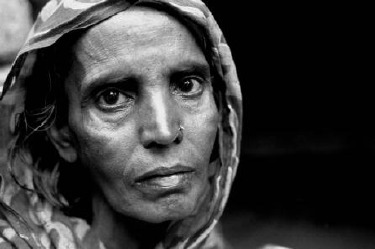 Editor’s Note: This is the second in our series of lessons to be learnt from the events of 1971. This particular piece was written by the late M.P. Bhandara, then member of the Pakistan parliament, for Dawn in 2005. The intensity of the sentiment on stranded Pakistanis remains equally valid today.)
Editor’s Note: This is the second in our series of lessons to be learnt from the events of 1971. This particular piece was written by the late M.P. Bhandara, then member of the Pakistan parliament, for Dawn in 2005. The intensity of the sentiment on stranded Pakistanis remains equally valid today.) 



 In a special joint session of the National Assembly and the Senate, the government today unveiled its promised “Baluchistan conciliation package” (synopsis of provisions and full text, below). This marks a small but important step forward in what one certainly hopes is a trend towards full integration of all Pakistanis into Pakistan. The package follows reform packages announced for FATA and for
In a special joint session of the National Assembly and the Senate, the government today unveiled its promised “Baluchistan conciliation package” (synopsis of provisions and full text, below). This marks a small but important step forward in what one certainly hopes is a trend towards full integration of all Pakistanis into Pakistan. The package follows reform packages announced for FATA and for 
